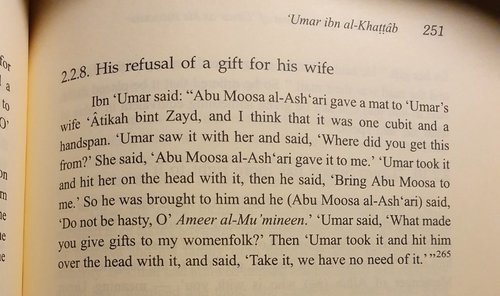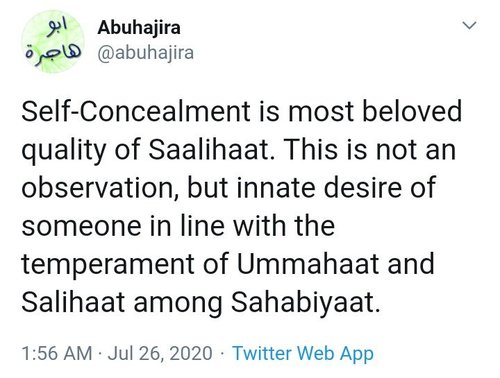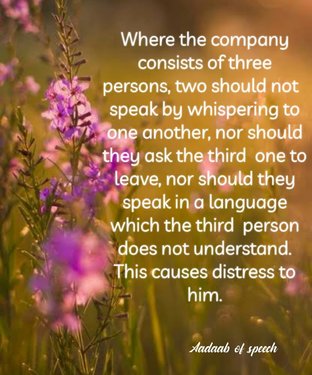-
Posts
1,761 -
Joined
-
Last visited
-
Days Won
106
Content Type
Profiles
Forums
Events
Everything posted by Bint e Aisha
-
الصَّمَدُ Translation الصَّمَدُ is translated as The Satisfier of All Needs and The Eternal. Definition It is defined as The One Who we turn to for all our needs and One Who satisfies all the needs of the creation of this world and the Aakhirah. He is sufficient for all of creation and He is self-sufficient. We need Him and He does not need anyone. Another definition is that He does not need nourishment and He is Baaqee (Eternal) and we are temporary. Another way to understand it according to a commentator is that الصَّمَدُ is a comprehensive collection of all His traits. Some Scholars say this name is the Ism A’dham. In the Qur’an It is mentioned only once in Surah Ikhlaas, اللَّهُ الصَّمَدُ - Allah is the Self-Sufficient (independent of all, while all are dependent on Him); A man heard another man reciting Qul Huwa Allaahu Ahad and repeating it. The next morning he came to the Messenger of Allah sallallaahu ‘alayhi wasallam and told him about that. The man thought that it was too little, but the Messenger of Allah sallallaahu ‘alayhi wasallam said: “By the One in Whose hand is my soul, it is equivalent to one-third of the Qur’an.” [Bukhari] Counsel To connect to this name we should know He is The One Who can satisfy all our needs and so we should have all our hopes in Allah ta’ala and not in others. *~~*~~*
-
الْاَحَدُ Translation الْاَحَدُ is also translated as The One but here there is more of a connotation of being alone. The Difference الْوَاحِدُ between and الْاَحَدُ الْوَاحِدُ is being unique and الْاَحَدُ is being alone. The number one in Arabic is وَاحِد and it has a second i.e. number two in Arabic is إثنان. It can be made feminine and a person can be described as وَاحِد - a unique person. الْاَحَدُ is alone in His attributes. There is no number two after it and it cannot be ascribed to a person i.e. a person can be described as كَريم but not اَحَد. It is exclusive to Allah ta’ala. Definition Ibn Katheer (Rahimahullah) says it is that being Who has no Mithl (Example). There is no similar Being to Him. اَحَد is exclusive to Allah ta’ala and nothing is comparable to Him in terms of His essence and His Sifaat. It is mentioned only once in the Qur’an in Surah Ikhlaas and it is used in the indefinite form which in Arabic, gives a word more expanse / comprehensiveness because when something is definite it is limited. Surah Ikhlaas It is regarded as one-third of the Qur’an. Scholars say the Qur’an is divided into three major themes and one of these is Tawheed and Surah Ikhlaas is all about Tawheed which is why it is regarded as one-third of the Qur’an. The first verse of Surah Ikhlaas is an affirmation of Tawheed and thereafter His prefect Sifaat are mentioned. In this Surah all the different ways of rejecting Tawheed are alluded to in a subtle way. Ways of Rejecting Tawheed There are different ways a person can reject Tawheed; • To reject Allah ta’ala altogether as atheists do • To believe in God but to not believe in His attributes • To believe in God and in His attributes but to do Shirk in deeds. There are different levels of Shirk and some Muslims also commit Shirk • To ask help from others • To attribute children to God as the Christians and the Mushrikeen did Ahad! Ahad! The story of Bilaal RA is known to everyone. When he was persecuted he kept repeating Ahad! Ahad! Why did he not say Waahid! Waahid!? It was because he was asked to accept the idols of the Mushrikeen and he was saying, “He is the Only One, there is no one like Him.” Scholars say it was an expression of his love for Allah ta’ala as when a person loves someone, they often mention the name of their beloved. It was also an answer to his tormentors and this tormented them in return. It is also said that he repeated the name as even though he was tormented, taking Allah ta’ala’s name gave him pleasure. There were so many Sahaba RA, but the name of Bilaal RA is known to every child. The Prophet sallallaahu ‘alayhi wasallam loved him and Allah ta’ala granted him the status of being the first to call out the Adhaan. After the death of the Prophet sallallaahu ‘alayhi wasallam he moved to Damascus and only returned to Madeenah once. Hasan RA requested him to call out the Adhaan and when he did, it brought back memories to the people of Madeenah of the time when the Prophet sallallaahu ‘alayhi wasallam was among them and Ahad! Ahad! was where it all began. Counsel To connect to this name, use it in Du’a to call out to Allah ta’ala and in any difficulty turn to Him first which we forget to do when a situation occurs. A person with firm Yaqeen in Tawheed will turn to Allah ta’ala in all situations and in all ‘Ibaadah. *~~*~~*
-
الْوَاحِدُ Translation الْوَاحِدُ is similar to الْاَحَدُ, both translated as “The One” but there is a difference. Here it is also translated as The All-Inclusive, The Indivisible and the manifestation of Unity. It is also translated as The Unique. Definition It is that Being Who is One and Alone and always has been so and no one can be another with Him. He is One in all His perfections and no one can be with Him in His perfections. He cannot be duplicated nor divided. Allah ta’ala is The One and everything stems from Him. One commentator says it is Waajib on us as His creation to believe He is Unique in all His perfection. Therefore the way we speak and act we have to regard Allah ta’ala as One and we have acknowledged it and all our worship is for Him. If we look at it mathematically, the Asl – core, of all math and number is one and it is by adding 1 and 1 that we get 2. An example mentioned in the commentary is that for the world, the sun is one and the source of light is white. However we see it in different forms and colours i.e. prisms or glass emits different colours. So Allah ta’ala is One and the way people regard / perceive / view Him is different. In the Qur’an It is mentioned 27 times in the Qur’an, at times as وَاحِد and other times as وَاحِدًا but never as الْوَاحِدُ. وَإِلَٰهُكُمْ إِلَٰهٌ وَاحِدٌ ۖ لَا إِلَٰهَ إِلَّا هُوَ الرَّحْمَٰنُ الرَّحِيمُ Your God is One God; there is no God save Him, the Beneficent, the Merciful. [Surah Baqarah: 163] يَا صَاحِبَيِ السِّجْنِ أَأَرْبَابٌ مُتَفَرِّقُونَ خَيْرٌ أَمِ اللَّهُ الْوَاحِدُ الْقَهَّارُ O my fellow-prisoners! Which is far better, many different lords or Allah—the One, the Supreme? [Surah Yusuf:39] This was when Yusuf AS was speaking to his fellow prisoners giving them Da’wah on the concept of Tawheed. Tawheed Tawheed is the foundation of our Deen and extremely important. No ‘Ibaadat is accepted without it and Allah ta’ala forgives everything except Shirk which is denial or negation of Tawheed. The mission of all the Ambiyaa was to teach Tawheed. The Prophet sallallaahu ‘alayhi wasallam sent Mu’adh ibn Jabal RA to Yemen in order to call the people to Islam and teach them the practices of the religion. Ibn Abbas RA reported that when the Prophet sallallaahu ‘alayhi wasallam sent Mu’adh RA to Yemen, he said to him: “Verily, you are coming to a people among the people of the Book, so call them to testify there is no God but Allah and I am the Messenger of Allah. If they accept that, then teach them that Allah has obligated five prayers in each day and night. If they accept that, then teach them that Allah has obligated charity to be taken from the rich and given to the poor. If they accept that, beware not to take from the best of their wealth. Be on guard from the supplication of the oppressed, for there is no barrier between it and Allah.” [Muslim] So he was sent to teach Tawheed even to the Ahle-Kitaab. Though they are regarded as monotheistic their religions are mixed in with other beliefs. Tawheed is included in any work of Da’wah. Even in the five pillars of Islam the first thing is Imaan and the Kalimah, the meaning of which is the concept of Tawheed. Wahdaaniyat of Allah ta’ala The Wahdaaniyat of Allah ta’ala is mentioned in the Qur’an in different ways. The Prophet sallallaahu ‘alayhi wasallam is told to say to the people, قُلْ إِنَّ صَلَاتِي وَنُسُكِي وَمَحْيَايَ وَمَمَاتِي لِلَّهِ رَبِّ الْعَالَمِينَ Say: Lo! my worship and, my sacrifice and my living and my dying are for Allah, Lord of the Worlds. [Surah An’aam: 162] In a Hadith Qudsi Allah ta’ala says, “The son of Adam denied Me and he had no right to do so. And he reviled Me and he had no right to do so. As for his denying Me, it is his saying: He will not remake me as He made me at first (1) - and the initial creation [of him] is no easier for Me than remaking him. As for his reviling Me, it is his saying: Allah has taken to Himself a son, while I am the One, the Everlasting Refuge. I begot not nor was I begotten, and there is none comparable to Me.(1) i.e., bring me back to life after death.” [Bukhari] Allah ta’ala calls it “reviling Him” and therefore every type of Shirk is vehemently forbidden. It is not permissible to compoare Allah ta’ala to any creation. Our minds are limited to creation and Allah ta’ala is beyond that and that is part of Allah ta’ala being الْوَاحِدُ – that He is diffenert to anything in the universe. Allah ta’ala says in the Qur’an, لَيْسَ كَمِثْلِهِ شَيْءٌ “There is nothing like Him [Surah Shura:11] This is also a concept of الْوَاحِدُ, that there is nothing like Him. He is alone in His uniqueness. In another place in the Qur’an Allah ta’ala says, وَقَالَ اللَّهُ لَا تَتَّخِذُوا إِلَٰهَيْنِ اثْنَيْنِ ۖ إِنَّمَا هُوَ إِلَٰهٌ وَاحِدٌ ۖ فَإِيَّايَ فَارْهَبُونِ Allah has commanded: "You shall not worship two gods: there exists only One God, I am the One Whom you should fear. [Surah Nahl:51] And in Surah Ambiyaa (verse 22), لَوْ كَانَ فِيهِمَا آلِهَةٌ إِلَّا اللَّهُ لَفَسَدَتَا If there were other gods in the heavens or in the earth besides Allah, both the heavens and earth would have been in a state of disorder. Allah ta’ala is talking about the skies and the earth saying that if there was in them another God besides Allah ta’ala they would have been corrupted. Having more than one person in charge can wreak havoc in the universe. Even in human sociology in group dynamics when you have more than one leader, it causes problems. A lot of these verses are from Madani Surahs trying to convince the Ahle Kitaab of Tawheed by giving rational and emotional proofs. In Surah Aali ‘Imraan (verse 8) Allah ta’ala Himself testifies to His Oneness; شَهِدَ اللَّهُ أَنَّهُ لَا إِلَٰهَ إِلَّا هُوَ وَالْمَلَائِكَةُ وَأُولُو الْعِلْمِ قَائِمًا بِالْقِسْطِ ۚ لَا إِلَٰهَ إِلَّا هُوَ الْعَزِيزُ الْحَكِيمُ Allah (Himself) is witness that there is no God save Him. And the angels and the men of learning (too are witness). Maintaining His creation in justice, there is no God save Him, the Almighty, the Wise. In Surah Saaffaat Allah ta’ala takes three oaths to emphasise the attribute of His Oneness; إِنَّ إِلَٰهَكُمْ لَوَاحِدٌ - Lo! thy Lord is surely One. We should testify to His Oneness in our beliefs, actions and lives and in the way we interact with creation. When a person has Yaqeen in the Oneness of Allah ta’ala and knows He is One and only He has perfect power, then it is only Him the person will turn to and fear only Him and not any person or system. *~~*~~*
-
-
-
-
Sufyan on Men: Who is weaker than a man unable to lower his gaze? Abu Nu’aym reported: Sufyan al-Thawri, may Allah have mercy on him, said, “A woman will pass by a man and he cannot restrain himself from looking at her lustfully although there is no benefit in it. What could be weaker than this?” Source: Ḥilyat al-Awliyā’ 7/68 عن أبي نعيم قال سفيان الثوري رحمه الله الْمَرْأَةُ تَمُرُّ بِالرَّجُلِ فَلَا يَمْلِكُ نَفْسَهُ عَنِ النَّظَرِ إِلَيْهَا وَلَا هُوَ يَنْتَفِعُ بِهَا فَأَيُّ شَيْءٍ أَضْعَفُ مِنْ هَذَا 7/68 حلية الأولياء وطبقات الأصفياء
-
الْمَاجِدُ الْمَاجِدُ is similar to الْوَاجِدُ but a more intense form and these two names are interchangeable. It is an Ism Faa’il and The One Who is Noble/Generous. *~~*~~*
-
الْوَاجِدُ Translation الْوَاجِدُ is translated as The Finder and The Resourceful. It comes from Wujd and is also translated as The One Who lacks nothing. It is not found in all the Asmaaul Husnaa books and there is not much commentary on this name. وَاجِد is a person who gets what he wants but this implies he did not have it and now he got it and this cannot be said about Allah ta’ala. When it is used for Allah ta’ala it means The One Who is Resourceful and lacks nothing. In the Qur'an, the verb وَجَدَ is translated as to find and that is why it is translated as The Finder. In the Qur’an In Surah Dhuhaa (verse 7-8), وَوَجَدَكَ ضَالًّا فَهَدَىٰ – Did He not find you lost and gave you guidance? وَوَجَدَكَ عَائِلًا فَأَغْنَىٰ - Did He not find you poor and made you self-sufficient? For us, Allah ta’ala is The Most Resourceful so when we need to ask, ask from Allah ta’ala. *~~*~~*
-
الْحَيُّ الْقَيُّومُ الْحَيُّ and الْقَيُّومُ will be discussed together. Translations الْحَيُّ comes from Hayaat (Life) and in this form it means The Ever Living and The Alive. الْقَيُّومُ comes from Qawmaa which literally means to stand. This is an intensive superlative form of Qawmaa meaning The Self-Existing and The Self-Subsisting and has the connotation of everlasting. It also comes from “establishment” so in that context it can also mean The One Who administers and oversees the universe. Definitions Ibnul Qayyim (Rahimahullah) says there are two parts to الْقَيُّومُ, • Allah ta’ala being Qaaim (established) and self-subsisting in His essence (Dhaat) and that means He is Self-subsisting and does not need anyone • Allah ta’ala being Qaaim in terms of establishment of His creation. Therefore Allah ta’ala is Qaaim Himself and He keeps everything Qaaim. He is Self-Subsisting and gives the universe the ability to subsist. الْحَيُّ is that being Whose existence is forever; He always was, always is and always will be. He has always been in existence and has existence which has no beginning or ending. This is something humans do not understand because for humans life begins and ends and for all creation there is a beginning and an ending (i.e. planets and stars which are millions of years old but they had a beginning and will have an ending). Another way to define it is One Who is always alive and never dies. He does not go through any type of non-existence. In Surah Qasas (verse 88) Allah ta’ala says, وَلَا تَدْعُ مَعَ اللَّهِ إِلَٰهًا آخَرَ ۘ لَا إِلَٰهَ إِلَّا هُوَ ۚ كُلُّ شَيْءٍ هَالِكٌ إِلَّا وَجْهَهُ ۚ لَهُ الْحُكْمُ وَإِلَيْهِ تُرْجَعُونَ And do not invoke any other god with Allah. There is no god ˹worthy of worship˺ except Him. Everything is bound to perish except He Himself. All authority belongs to Him. And to Him you will ˹all˺ be returned. Therefore His existence is Baaqee (Will always be there). It is pre-eternal and eternal. There are two words in Arabic, أَبَد and أزَل (forever/eternal) which have a similar meaning but has a slight difference. أَبَد means something that will never end i.e. Allah ta’ala says in the Qur’an خَالِدِينَ فِيهَا أَبَدًا – i.e. people will be in Jannah forever. It is not pre-eternal but once it is made then it is forever. The soul/Rooh for example, is “Abadi.” أزَل is something that was always there and always will be there so it is pre-eternal. Only Allah ta’ala is pre-eternal as everything else has a beginning though some things like Jannah and Jahannam are “Abadi” (forever) after their beginning. Allah ta’ala is both أزَل and أَبَد and Azal includes Abad. The attributes of Allah ta’ala have different categories and الْحَي is from the Sifaati Dhaatiyaa (Inherent in Himself) and الْقَيُّوم is from the Sifaati Af’aal (His actions i.e. He is active, interacting, overseeing, administering.) In the Qur’an Both these Sifaat are mentioned together in the Qur’an three times. 1. In Aayatul Kursi (Surah Baqarah: 255) - اللَّهُ لَا إِلَٰهَ إِلَّا هُوَ الْحَيُّ الْقَيُّومُ. Right after this Allah ta’ala says, لَا تَأْخُذُهُ سِنَةٌ وَلَا نَوْمٌ- He neither slumbers nor sleeps. Allah ta’ala not being tired is evidence of His being قَيُّوم . He is beyond being tired or sleepy and He cannot be tired or sleepy in administering and subsisting the creation. 2. Surah Aali ‘Imraan, verse 2 (Same as above) in conjunction with Tawheed. This is evidence of Allah ta’ala’s Oneness i.e. there is only One Being Who is Self-Existing, Self-Subsisting and keeping the universe going. 3. Surah Taha: 111 وَعَنَتِ الْوُجُوهُ لِلْحَيِّ الْقَيُّومِ (Their faces shall be humbled before the Ever-Living, the Ever-existent). Commentators say regarding this verse; وَجَعَلْنَا مِنَ الْمَاءِ كُلَّ شَيْءٍ حَيٍّ - And We have created every living thing from water [Surah Ambiyaa:30] Allah ta’ala is الْحَي and He is also the giver of live and He gives life according to how He wants i.e. humans with intelligence and other forms with varying levels of intelligence, plants, micro-organisms etc. In Du’a It is mentioned in Hadith that when in difficulty or distress, recite: O Living, O Sustaining, in Your Mercy I seek relief! يَا حَيُّ يَا قَيُّومُ بِرَحْمَتِكَ أَسْتَغِيثُ ‘Ali RA says during the Battle of Badr he found the Prophet sallallaahu ‘alayhi wasallam in Sajdah repeating يَا حَيُّ يَا قَيُّومُ. The Muslims were facing a huge army in Battle of Badr. It was under extreme circumstances that the Prophet sallallaahu ‘alayhi wasallam called out Allah ta’ala by these two names so we too can call out to Allah ta’ala by these names in Sajdah without asking for anything. Importance of the Combination of الْحَيُّ الْقَيُّومُ Some Scholars say this combination of الْحَيُّ الْقَيُّومُ is Ism A’zam by which Du’a are accepted. Ubayy ibn Ka’b reported that the Prophet sallallaahu ‘alayhi wasallam said, “O Abu Mundhir, do you know the greatest verse in the book of Allah?” I said, “Allah and His Messenger know best.” The Prophet sallallaaahu ‘alayhi wasallam said, “O Abu Mundhir, do you know the greatest verse in the book of Allah?” I recited the verse of the throne (ayat al-Kursi), “Allah, there is no God but Him, the Living, the Sustainer.” (2:255) The Prophet struck me on the chest and he said, “By Allah, Abu Mundhir, rejoice in this knowledge!” [Muslim] The Prophet sallallaahu ‘alayhi wasallam once mentioned to Faatimah RA to recite the following supplication morning and evening, يا حَـيُّ يا قَيّـومُ بِـرَحْمَـتِكِ أَسْتَـغـيث ، أَصْلِـحْ لي شَـأْنـي كُلَّـه ، وَلا تَكِلـني إِلى نَفْـسي طَـرْفَةَ عَـين ‘Yaa hayyu yaa qayoomu, birahmatika astagheeth. Aslih liy sha-aniykulluhu wa laa takilniy ilaa nafsiy tarfata aynin.’ (Translation: On You Who is Everliving and Sustains and Protects everything, I seek assistance through the means of your mercy, correct for me all my affairs and do not entrust me to my Nafs (myself) for the moment of a blink of an eye.’) [Mustadrakal-Haakim , Shu’ubul Iemaan of Imaam Bayhaqi] It is narrated that the Prophet sallallaahu ‘alayhi wasallam heard a man saying: “O Allah, I ask of You by the fact that You are Allah, there is no god except You, the One, the Self-Sufficient Master, who begets not, nor was He begotten, and there is none co-equal or comparable unto Him.” He sallallaahu ‘alayhi wasallam said, “He has called upon Allah by His Greatest Name, which if He is asked by it, He gives, and if He is called upon by it, He responds.” [Tirmidhi and Abu Dawood] For Forgiveness If a person says the following 3 times before going to bed, أَسْتَغْفِرُ اللَّهَ الْعَظِيمَ الَّذِي لاَ إِلَهَ إِلاَّ هُوَ الْحَيُّ الْْقَيُّومُ وَ أَتُوبُ إِلَيْهِ I seek the forgiveness of Allah the Mighty, Whom there is none worthy of worship except Him, The Living, The Eternal, and I repent unto Him … he will be forgiven even if he has committed sins as much as the foam of an ocean. [Abu Dawood Tirmidhi] The Prophet sallallaahu ‘alayhi wasallam said if a person recites the above his sins will be forgiven even if he should have run away from the battlefield. We do not have the reality of the power of Du’a with the names of Allah ta’ala in them. We should try to understand the words and make Du’a with feeling. Make the Heart Alive Ibn Taymiyyah (Rahimahullah) narrates that if a person recites 40 times between the Sunnah and Fardh of Fajr Salaah the following, the person’s heart will become alive and it will be protected from dying. بِرَحْمَتِكَ أَسْتَغِيثُ لاَ إِلَهَ إِلاَّ أَنْتَ يَا حَىُّ يَا قَيُّومُ We should practice on this especially when feeling spiritually low as the Prophet sallallaahu ‘alayhi wasallam said, “There lies within the body a piece of flesh. If it is sound, the whole body is sound; and if it is corrupted, the whole body is corrupted. Verily this piece is the heart.” [Bukhari, Muslim] Cannot be used in Name قَيُّوم cannot be used as a name as only Allah ta’ala is قَيُّوم though عَبْد القَيُّوم can be used. When one realises that Allah ta’ala is الْقَيُّومُ and He is The One Who is always there while people come and go, then one will trust in Him alone. *~~*~~*
-
اللھم لا تجعلنا منھم
- 1 reply
-
- 1
-

-
-
*QUESTION* Please let me know on whom Qurbani is obligatory.It has been practice to make Qurbani for Prophet MUHAMMAD(Peace be upon him) and for deceased, family members is this allowed. *ANSWER* In the name of Allah, Most Gracious, Most Merciful Assalaamu `alaykum waRahmatullahi Wabarakatuh 1. Free (not a slave) 2. Muslim 3. Muqīm (not a traveler) 4. Owns the amount of nisāb of zakāh مجمع الأنهر - (ج 2 / ص 514)( وإنما تجب ) التضحية دون الأضحية لما تقرر من أن الوجوب من صفات الفعل إلا أن القدوري ومن تبعه قال : ذلك توسعة ومجاز والمراد بالوجوب الوجوب العملي لا الاعتقادي حتى لا يكفر جاحدها كما في المنح ( على حر ) فلا تجب على العبد ( مسلم ) فلا تجب على الكافر ( مقيم ) فلا تجب على المسافر لقول علي رضي الله تعالى عنه ليس على مسافر جمعة ولا أضحية وعن مالك لا يشترط الإقامة ويستوي فيه المقيم بالمصر والقوي والبوادي ( موسر ) ؛ لأن العبادة لا تجب إلا على القادر وهو الغني دون الفقير ومقداره ما تجب فيه صدقة الفطر وقوله ( عن نفسه ) يتعلق بقوله تجب ؛ لأنه أصل في الوجوب عليه Nabi صلى الله عليه وسلم made qurbāni on behalf of his ummah. Similarly, it has been narrated the Sayyidunā Ali رضي الله تعالى عنه used to make qurbāni on behalf of Nabi صلى الله عليه وسلم. سنن أبى داود مع بذل المجهود - (2795)حدثنا إبراهيم بن موسى الرازي حدثنا عيسى حدثنا محمد بن إسحق عن يزيد بن أبي حبيب عن أبي عياش عن جابر بن عبد الله قال ذبح النبي صلى الله عليه وسلم يوم الذبح كبشين أقرنين أملحين موجأين فلما وجههما قال إني وجهت وجهي للذي فطر السموات والأرض على ملة إبراهيم حنيفا وما أنا من المشركين إن صلاتي ونسكي ومحياي ومماتي لله رب العالمين لا شريك له وبذلك أمرت وأنا من المسلمين اللهم منك ولك وعن محمد وأمته باسم الله والله أكبر ثم ذبح Sayyiduna Jabir ibn Abdullah narrates that Nabi صلى الله عليه وسلم on the day of slaughtering, slaughtered two castrated rams which had horns and was more white than black in colour. When he had them facing the qiblah, he recited: {إِنِّي وَجَّهْتُ وَجْهِيَ لِلَّذِي فَطَرَ السَّمَاوَاتِ وَالْأَرْضَ حَنِيفاً وَمَا أَنَا مِنَ الْمُشْرِكِينَ}إِنَّ صَلاتِي وَنُسُكِي وَمَحْيَايَ وَمَمَاتِي لِلَّهِ رَبِّ الْعَالَمِينَ لا شَرِيكَ لَهُ وَبِذَلِكَ أُمِرْتُ وَأَنَا أَوَّلُ الْمُسْلِمِينَاللهم منك ولك وعن محمد وأمته باسم الله والله أكبر I have, indeed, turned my face straight towards the One who created the heavens and the earth, and I am not one of those who associate partners. My prayer my sacrifice my life my death is for Allah the lord of the worlds. He has no partner. Thus I have been commanded and I am the first to submit.O Allah this is from You and for You on behalf of Muhammad and his ummah. Then he slaughtered them. سنن أبى داود مع بذل المجهود - (2790)2408 - حدثنا عثمان بن أبي شيبة حدثنا شريك عن أبي الحسناء عن الحكم عن حنش قالرأيت عليا يضحي بكبشين فقلت له ما هذا فقال إن رسول الله صلى الله عليه وسلم أوصاني أن أضحي عنه فأنا أضحي عنه Hanashرحمه الله تعالى mentions:I saw Ali slaughtering two rams. So I asked what is this? He replied that Nabi صلى الله عليه وسلم bequeathed that I slaughter on his behalf. Therefore, I am slaughtering. سنن الترمذى - (1495)حَدَّثَنَا مُحَمَّدُ بْنُ عُبَيْدٍ الْمُحَارِبِيُّ الْكُوفِيُّ حَدَّثَنَا شَرِيكٌ عَنْ أَبِي الْحَسْنَاءِ عَنْ الْحَكَمِ عَنْ حَنَشٍ عَنْ عَلِيٍّأَنَّهُ كَانَ يُضَحِّي بِكَبْشَيْنِ أَحَدُهُمَا عَنْ النَّبِيِّ صَلَّى اللَّهُ عَلَيْهِ وَسَلَّمَ وَالْآخَرُ عَنْ نَفْسِهِ فَقِيلَ لَهُ فَقَالَ أَمَرَنِي بِهِ يَعْنِي النَّبِيَّ صَلَّى اللَّهُ عَلَيْهِ وَسَلَّمَ فَلَا أَدَعُهُ أَبَدًاقَالَ أَبُو عِيسَى هَذَا حَدِيثٌ غَرِيبٌ لَا نَعْرِفُهُ إِلَّا مِنْ حَدِيثِ شَرِيكٍ وَقَدْ رَخَّصَ بَعْضُ أَهْلِ الْعِلْمِ أَنْ يُضَحَّى عَنْ الْمَيِّتِ وَلَمْ يَرَ بَعْضُهُمْ أَنْ يُضَحَّى عَنْهُ و قَالَ عَبْدُ اللَّهِ بْنُ الْمُبَارَكِ أَحَبُّ إِلَيَّ أَنْ يُتَصَدَّقَ عَنْهُ وَلَا يُضَحَّى عَنْهُ وَإِنْ ضَحَّى فَلَا يَأْكُلُ مِنْهَا شَيْئًا وَيَتَصَدَّقُ بِهَا كُلِّهَا قَالَ مُحَمَّدٌ قَالَ عَلِيُّ بْنُ الْمَدِينِيِّ وَقَدْ رَوَاهُ غَيْرُ شَرِيكٍ قُلْتُ لَهُ أَبُو الْحَسْنَاءِ مَا اسْمُهُ فَلَمْ يَعْرِفْهُ قَالَ مُسْلِمٌ اسْمُهُ الْحَسَنُ Hanash رحمه الله تعالىmentions that Sayyiduna Ali رضي الله تعالى used to slaughter two rams, one for Nabi صلى الله عليه وسلم and the other for himself. When questioned regarding this he replied that Nabi صلى الله عليه وسلم commanded me. Therefore, I will never leave this practice. (Tirmidi 1495) These narrations show Nabi صلى الله عليه وسلم’s love for performing qurbani that even after his demise he still wants qurbāni to be performed on his behalf. Therefore, whoever loves Nabi صلى الله عليه وسلم should also try to do qurbāni on his behalf and fulfill his wish and desire. And Allah knows best Wassalaamu `alaykum Ml. Ishaq E. Moosa, Student Darul IftaaChecked and Approved by:Mufti Ebrahim Desai Darul Iftaa
-

On Taqwa (Piety / God Consciousness)
Bint e Aisha replied to ummtaalib's topic in Matters of the Heart
I'm on level 1 by the fadhl of Allah. May Allah make me reach level 4. Ameen -
It was said to ‘Aa’ishah (may Allah be pleased with her): Which type of woman is best? She said: The one who does not know about saying bad things, and she is not crafty like men; her focus is on adorning herself for her husband and taking care of her family. [Muhaadaraat al-Udaba’ by ar-Raaghib al-Asfahaani (1/410); ‘Uyoon al-Akhbaar by Ibn Qutaybah (1/375).]
-

Women Proposing Marriage to Men in Islam
Bint e Aisha replied to ColonelHardstone's topic in Hanafi Fiqh (Women)
Excellent presentation! جزاك الله خيرا -
CONCEAL YOUR BLESSINGS Question I heard this saying attributed to Nabi (sallahu ‘alayhi wasallam) at a gathering and was wondering if you could comment on its authenticity and explain its meaning: استعينوا على قضاء حوائجكم بالكتمان فإن كل ذي نعمة محسود Answer These words have been reported as a Hadith by several Sahabah (radiyallahu’anhum) with chains that vary in their levels of weakness. (Refer: Al-Maqasidul Hasanah, Hadith: 103, Takhrijul Kash-shaf of Zayla’i, vol.2 pg.360 and Sharhul Ihya, vol.8 pg.54.) However, its broader meaning is supported by other texts. See here for these supports. Translation Take help in fulfilling your needs by concealing them. For indeed every favoured person is envied. The explanation of this is that often one encounters people who may be jealous of one’s endeavours and initiatives. If one were to share his plans of achieving certain goals with people, one may find an envious person either becoming an obstacle or even affecting one with the evil eye. Therefore it is best for one to keep one’s plans/aspirations to one’s self and only to those who may assist and who do not become jealous. (Also see Faydul Qadir, Hadith: 985 and At-Taysir, vol.1 pg.147) And Allah Ta’ala Knows best, Answered by: Moulana Muhammad Abasoomar Checked by: Moulana Haroon Abasoomar
-
Question: To what age of the child is the father responsible for the financial support of children Answer In the Name of Allah, the Most Gracious, the Most Merciful. As-salāmu ‘alaykum wa-rahmatullāhi wa-barakātuh. It is the responsibility of the father to maintain his daughters until they get married and his sons until they become mature (Baaligh). However, if one’s son is Baaligh, but cannot fend for himself, then the father must still support him until he can fend for himself.[ii] And Allah Ta’āla Knows Best Checked and Approved by, Mufti Ebrahim Desai البحر الرائق شرح كنز الدقائق ومنحة الخالق وتكملة الطوري (4/ 228) وَقَيَّدْنَا بِالْعَجْزِ عَنْ الْكَسْبِ وَهُوَ بِالْأُنُوثَةِ مُطْلَقًا وَبِالزَّمَانَةِ وَالْعَمَى وَنَحْوِهَا فِي الذَّكَرِ فَنَفَقَةُ الْمَرْأَةِ الصَّحِيحَةِ الْفَقِيرَةِ عَلَى مَحْرَمِهَا فَلَا يُعْتَبَرُ فِي الْأُنْثَى إلَّا الْفَقْرُ، وَأَمَّا الْبَالِغُ الْفَقِيرُ فَلَا بُدَّ مِنْ عَجْزِهِ بِزَمَانَةٍ أَوْ عَمًى أَوْ فَقْءِ الْعَيْنَيْنِ أَوْ شَلَلِ الْيَدَيْنِ أَوْ مَقْطُوعِ الرِّجْلَيْنِ أَوْ مَعْتُوهٍ أَوْ مَفْلُوجٍ زَادَ فِي التَّبْيِينِ أَنْ يَكُونَ مِنْ أَعْيَانِ النَّاسِ يَلْحَقُهُ الْعَارُ مِنْ التَّكَسُّبِ أَوْ طَالِبَ عِلْمٍ لَا يَتَفَرَّغُ لِذَلِكَ وَفِي الْمُجْتَبَى الْبَالِغُ إذَا كَانَ عَاجِزًا عَنْ الْكَسْبِ وَهُوَ صَحِيحٌ فَنَفَقَتُهُ عَلَى الْأَبِ وَهَكَذَا قَالُوا فِي طَالِبِ الْعِلْمِ إذَا كَانَ لَا يَهْتَدِي إلَى الْكَسْبِ لَا تَسْقُطُ نَفَقَتُهُ عَنْ الْأَبِ بِمَنْزِلَةِ الزَّمِنِ وَالْأُنْثَى الفتاوى الهندية (1/ 563) وَنَفَقَةُ الْإِنَاثِ وَاجِبَةٌ مُطْلَقًا عَلَى الْآبَاءِ مَا لَمْ يَتَزَوَّجْنَ إذَا لَمْ يَكُنْ لَهُنَّ مَالٌ كَذَا فِي الْخُلَاصَةِ. كتاب المسائل 5/484 شادی ہونے تک لڑکیوں کے نان نفقہ کی پوری ذمہ داری باپ پر ہے ( لیکن وہ لڑکیاں اگڑ سلائی کڑھائی یا کسی جائز عمل کے ذریعہ کچھ پیسہ کمالیں تو اُن کے اِخراجات اُسی پیسہ سے پورے کئے جائیںگے ) فتاوى حقانية 5/25 [ii] المحيط البرهاني (4/ 91) فأما نفقة الابن الكبير فليس على الأب إذا كان معسراً المحيط البرهاني للإمام برهان الدين ابن مازة (4/ 270) [2] قال: والصحيح الذي به قوة العمل إلا أنه لا يُحْسِنْ العمل فنفقته على الأب إذا كان لا يحسن العمل، والناس لا يأمروه بالعمل، فصار هو كالعاجز عن الكسب قال شمس الأئمة الحلواني رحمه الله: الرجل الصحيح قد لا يقدر على الكسب لحرفة أو لكونه من أهل البيوتات فيكون عاجزاً عن الكسب. فإذا كان هكذا كان نفقته على الأب وهكذا قالوا في طالب العلم: إذا كان لا يهتدي إلى الكسب لا تسقط نفقته على الأب بمنزلة الزَّمِنْ والأنثى، هذا الذي ذكرنا كلّه إن كان الأب حاضراً الفتاوى الهندية (11/ 448) ولا يجب على الأب نفقة الذكور الكبار إلا أن الولد يكون عاجزا عن الكسب لزمانة، أو مرض ومن يقدر على العمل لكن لا يحسن العمل فهو بمنزلة العاجز كذا في فتاوى قاضي خان الدر المختار وحاشية ابن عابدين (رد المحتار) (3/ 612) (وَتَجِبُ) النَّفَقَةُ بِأَنْوَاعِهَا عَلَى الْحُرِّ (لِطِفْلِهِ) يَعُمُّ الْأُنْثَى وَالْجَمْعَ (الْفَقِيرِ) الْحُرِّ، فَإِنَّ نَفَقَةَ الْمَمْلُوكِ عَلَى مَالِكِهِ وَالْغَنِيِّ فِي مَالِهِ الْحَاضِرِ؛ فَلَوْ غَائِبًا فَعَلَى الْأَبِ ثُمَّ يَرْجِعُ إنْ أَشْهَدَ لَا إنْ نَوَى إلَّا دِيَانَةً؛ فَلَوْ كَانَا فَقِيرَيْنِ فَالْأَبُ يَكْتَسِبُ أَوْ يَتَكَفَّفُ وَيُنْفِقُ عَلَيْهِمْ (قَوْلُهُ بِأَنْوَاعِهَا) مِنْ الطَّعَامِ وَالْكُسْوَةِ وَالسُّكْنَى، وَلَمْ أَرَ مَنْ ذَكَرَ هُنَا أُجْرَةَ الطَّبِيبِ وَثَمَنَ الْأَدْوِيَةِ، وَإِنَّمَا ذَكَرُوا عَدَمَ الْوُجُوبِ لِلزَّوْجَةِ، نَعَمْ صَرَّحُوا بِأَنَّ الْأَبَ إذَا كَانَ مَرِيضًا أَوْ بِهِ زَمَانَةٌ يَحْتَاجُ إلَى الْخِدْمَةِ فَعَلَى ابْنِهِ خَادِمُهُ وَكَذَلِكَ الِابْنُ (قَوْلُهُ لِطِفْلِهِ) هُوَ الْوَلَدُ حِينَ يَسْقُطُ مِنْ بَطْنِ أُمِّهِ إلَى أَنْ يَحْتَلِمَ، وَيُقَالُ جَارِيَةٌ، طِفْلٌ، وَطِفْلَةٌ، كَذَا فِي الْمُغْرِبِ. وَقِيلَ أَوَّلُ مَا يُولَدُ صَبِيٌّ ثُمَّ طِفْلٌ (قَوْلُهُ الْفَقِيرِ) أَيْ إنْ لَمْ يَبْلُغْ حَدَّ الْكَسْبِ، فَإِنْ بَلَغَهُ كَانَ لِلْأَبِ أَنْ يُؤْجِرَهُ أَوْ يَدْفَعَهُ فِي حِرْفَةٍ لِيَكْتَسِبَ وَيُنْفِقَ عَلَيْهِ مِنْ كَسْبِهِ لَوْ كَانَ ذَكَرًا، بِخِلَافِ الْأُنْثَى كَمَا قَدَّمَهُ فِي الْحَضَانَةِ عَنْ الْمُؤَيِّدِيَّةِ. آپ کے مسائل اور ان کا حال ج 6 ص 734 بچے کا خرچ اس کے باپ کے ذمہ ہے اس کا فرض تھا کے بچے کے اخراجات ادا کرتا http://askimam.org/public/question_detail/45666
-
-
https://youtu.be/d-E5FT2DG-M
-
Jabir reported: The Messenger of Allah, peace and blessings be upon him, said, “When a man retires to his bed, an angel and a devil rush to him. The angel says: End your day with good! The devil says: End your day with evil! If he remembers Allah and then falls sleep, the angel will spend the night to take care of him.” Source: al-Sunan al-Kubrā lil-Nasā’ī 10624 Grade: Hasan (fair) according to Ibn Hajar عَنْ جَابِرٍ أَنَّ رَسُولَ اللهِ صَلَّى اللهُ عَلَيْهِ وَسَلَّمَ قَالَ إِذَا أَوَى الرَّجُلُ إِلَى فِرَاشِهِ ابْتَدَرَهُ مَلَكٌ وَشَيْطَانٌ فَيَقُولُ الْمَلَكُ اخْتِمْ بِخَيْرٍ وَيَقُولُ الشَّيْطَانُ اخْتِمْ بِشَرٍّ فَإِنْ ذَكَرَ اللهَ ثُمَّ نَامَ بَاتَ الْمَلَكُ يَكْلَؤُهُ 10624 السنن الكبرى للنسائي 1/25 المحدث ابن حجر العسقلاني خلاصة حكم المحدث حسن في الأمالي الحلبية
- 3 replies
-
- bad dreams
- dreams
-
(and 1 more)
Tagged with:
-

Aadaab (Etiquettes) of Speech
Bint e Aisha replied to Bint e Aisha's topic in Inspiring Quotes & Poems
-

Aadaab (Etiquettes) of Speech
Bint e Aisha replied to Bint e Aisha's topic in Inspiring Quotes & Poems
-

Aadaab (Etiquettes) of Speech
Bint e Aisha replied to Bint e Aisha's topic in Inspiring Quotes & Poems
-

Aadaab (Etiquettes) of Speech
Bint e Aisha replied to Bint e Aisha's topic in Inspiring Quotes & Poems










